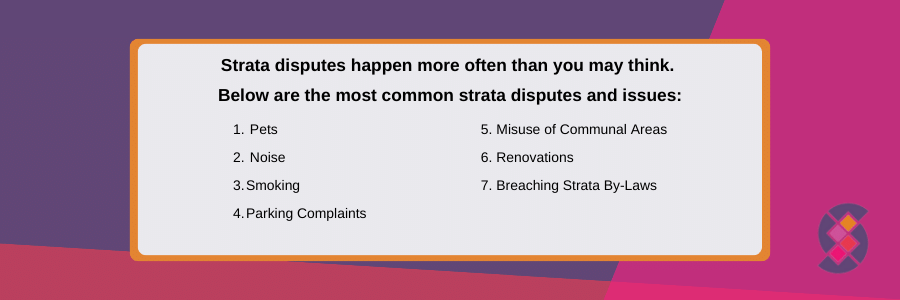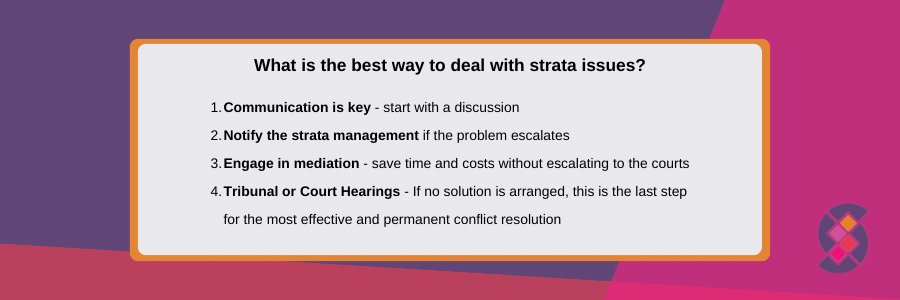7 Common Strata Disputes & Tips for Resolving Strata Issues
Strata disputes are an unfortunate inevitability, but with some care and good intentions, many can be resolved through the efforts of strata dispute resolution.
Given that many residents with differing values and behaviours are in the same building, it’s the harsh truth that not everyone will get along.
However, the old proverb ‘familiarity breeds contempt’ needn’t apply; although strata issues are frustrating for all involved, there are plenty of peaceful and amicable ways to resolve them.
At Strata Data, over 40 years of body corporate management has taught us the ins and outs of strata dispute resolution. We’ve seen, managed, and resolved everything from parking complaints to unapproved renovations.
But we also know that resolving strata disputes is rarely easy. That’s why, in this article, we’ll discuss the seven most common conflicts and provide helpful tips on how to deal with strata issues.
Table of Contents
- What is a strata dispute?
- Who is responsible for handling strata disputes?
- Most common strata disputes & issues
-
- Pets
- Noise
- Smoking
- Parking complaints
- Misuse of communal areas
- Renovations
- Breaching strata by-laws
- How to deal with strata issues
-
- Start with a discussion
- Flag with strata management
- Engage in Mediation
- Tribunal or court hearings
What is a strata dispute?
It may seem like a simple enough term; however, strata disputes are often anything but.
Strata disputes are disagreements between any involved parties in a strata scheme, whether an owner, a resident, or a strata management committee member.
Strata disputes — and the processes to resolve them —range from simple disagreements to full-blown tribunal or court hearings.
Drastic? Maybe so, but that’s the reality, and why you should be aware of the most common strata issues and how to deal with them.
Who is responsible for handling strata disputes?
Strata dispute resolution is required to prevent strata disputes from getting too heated or complicated. While in many cases, a strata manager may be able to assist in brokering peace and finding solutions, the division of responsibility largely depends on the individual issue and who is involved. Also it is common that dispute resolution is not considered part of the base management duties of a strata manager and so additional fees from the manager to mediate disputes may apply.
Several possible combinations give way to the most common disputes in strata communities:
- Owner and Owner
- Owner and Tenant
- Owner and Committee
- Tenant and Committee
- Committee member and Committee member
7 most common strata disputes & issues

1. Pets
Sadly, pets like dogs and cats are among the most common causes of strata disputes. Although they may be cute they can also on occasion be a source of mess or noise.
Some strata residents may not be as fond of animals or have allergies. Pets might even be responsible for bringing fleas and other pests into the complex.
Usually, strata by-laws come with a clause about pet ownership and breaking them may have consequences for you and your furry friend, so be sure to read through your contract with a fine-tooth comb — or apply for written permission — before bringing a pet into your lot.
2. Noise
From upstairs neighbours having loud parties with heavy music to downstairs neighbours that turn the TV up way too loud, living in a shared complex can sometimes sound like you’ve got some rather boisterous siblings.
We get it — people want to feel at home in their strata lot, and part of that is singing their favourite tunes while cleaning up and having guests over for a good time.
But strata residents should always consider the other homeowners around them and how their noise will affect them.
Police can enforce noise curfews and strata managers can encourage residents to limit their noise after a specific time based on the specific strata by laws noise restrictions.
3. Smoking
Some strata complexes consider smoking and vaping on common property a big ‘no-no’. So, if a resident breaches a no-smoking rule this can cause the body corporate to act to prevent this occuring in the future.
Especially if the smoke from their apartment drifts over to other balconies and blocks, residents can complain about a smoker to the strata manager, who may, in turn, be instructed to discuss with the resident, and if necessary to take the matter further.
4. Parking complaints
We’ve seen this particular strata issue get pretty heated. Residents in strata buildings often rely on their parking spots to store their vehicles and utilise shared driveways to come and go to work.
But with potentially dozens of vehicles needing access to their respective properties, strata disputes over parking spaces and vehicular access are exceedingly common.
Some of the most common strata issues surround:
- Blocking access to common property
- Obstructing shared driveways
- Parking in another resident’s parking lot
5. Misuse of communal areas
Strata buildings, by nature, are a shared community with communal areas such as driveways, gardens, roofs, stairways, and lobbies.
Misusing or causing damage to these areas is a breach of strata etiquette and by-laws that may cause disputes between residents, neighbours, and the body corporate.
6. Renovations
While strata-approved renovations occurring during reasonable hours are generally not a problem, it’s when a resident starts pulling a bathroom apart at 3 AM that complaints arise.
To avoid disputes in strata buildings over improvements and renovations, it’s good practice for strata managers to notify residents of renovation and construction work — and for owners and residents to go through the appropriate steps to get renovation approval.
Strata managers can also arrange for general building renovation to occur during more convenient hours — i.e., not at the crack of dawn or in the middle of the night.
7. Breaching strata by-laws
Many strata properties are likely to have specific by-laws surrounding the previous six common strata disputes, as well as other items.
Residents should feel free to report breaches of by-laws restricting activities like smoking, pet ownership, or late-night noise.
How to deal with strata issues

While the term ‘strata dispute resolution’ may sound official, it’s not exclusively the responsibility of the body corporate or strata management — it’s up to whoever’s involved in the strata dispute.
When you’re dealing with strata issues, the following steps should always be considered:
1. Start with a discussion
Great communication is often all it takes to resolve strata disputes.
Simply talking is a much easier, cheaper, and less stressful way to resolve a dispute than instantly elevating it to a court proceeding.
Approaching strata issues with tact, clarity, and calm honesty may require both parties to compromise. It also necessitates both talking and listening — and one can never exist without the other if you want to reach an amicable agreement and resolve the dispute successfully.
Although some people may feel threatened or confronted, starting a calm discussion should always be the first step to resolving strata disputes.
2. Flag with strata management and/or the committee
Strata management and the committee are there for a reason.
If the strata dispute has become out of your control, you can flag the issue with strata management and/or the committee.
Escalating the dispute is preferably a mutual decision between all parties.
3. Engage in Mediation
An unbiased, outside perspective provides clarity to the involved parties, and that’s why mediation is another popular form of dispute resolution for strata issues.
Strata mediation saves time and costs by not escalating the situation to the court. While not legally binding, mediation carries goodwill and results in an amicable resolution.
4. Tribunal or court hearings
After unsuccessful discussions, a strata dispute may be escalated to a government-run tribunal or court hearing.
The decisions made by the tribunal or court about your strata dispute are legally binding.
Tribunal or court hearings are perhaps the most drastic measure to resolve conflict in strata communities, but also one of the more effective and permanent resolutions.
Final Thoughts
Whether the issue is damage to common areas, ill-timed renovations, noise pollution, or something else, strata disputes are best resolved as quickly and peacefully as possible, for the sake of all parties involved.
If a strata dispute threatens to grow beyond your control, you can rely on the body corporate experts at Strata Data to find a peaceful resolution.
We provide strata management and strata dispute resolution services across South Australia, so give us a call if you have a strata issue that needs resolving.



